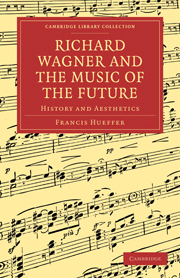Book contents
Summary
A considerable part of the contents of the present volume has been previously published in the ‘Fortnightly Review;’ a smaller portion, consisting chiefly of the letters of K. Schumann, appeared in the ‘Academy.’ Everything, however, has been recast and made subservient to the purposes of this book, about which the author now begs leave to make a few introductory remarks.
Musicians and theorists of all colours (for now-a-days one must distinguish the different shades of party opinion, in music as well as in politics or religion) agree in the one point, that, by the works of Beethoven's latter years, and especially by the Ninth Symphony of that master, a new phase is marked in the history of their art. In the last-mentioned work, or, to speak quite accurately, in its three first movements, it was finally shown, how far music in its separate condition could go in achieving the ultimate aim of all art, i.e., the rendering of the emotions of the human heart. It may in this respect be called the triumph of absolute music; and, indeed, no symphonic work of a later period can be said to have surpassed, or even equalled in beauty and power of expression, this gigantic effort of a master-mind.
- Type
- Chapter
- Information
- Richard Wagner and the Music of the FutureHistory and Aesthetics, pp. iii - viPublisher: Cambridge University PressPrint publication year: 2009First published in: 1874

